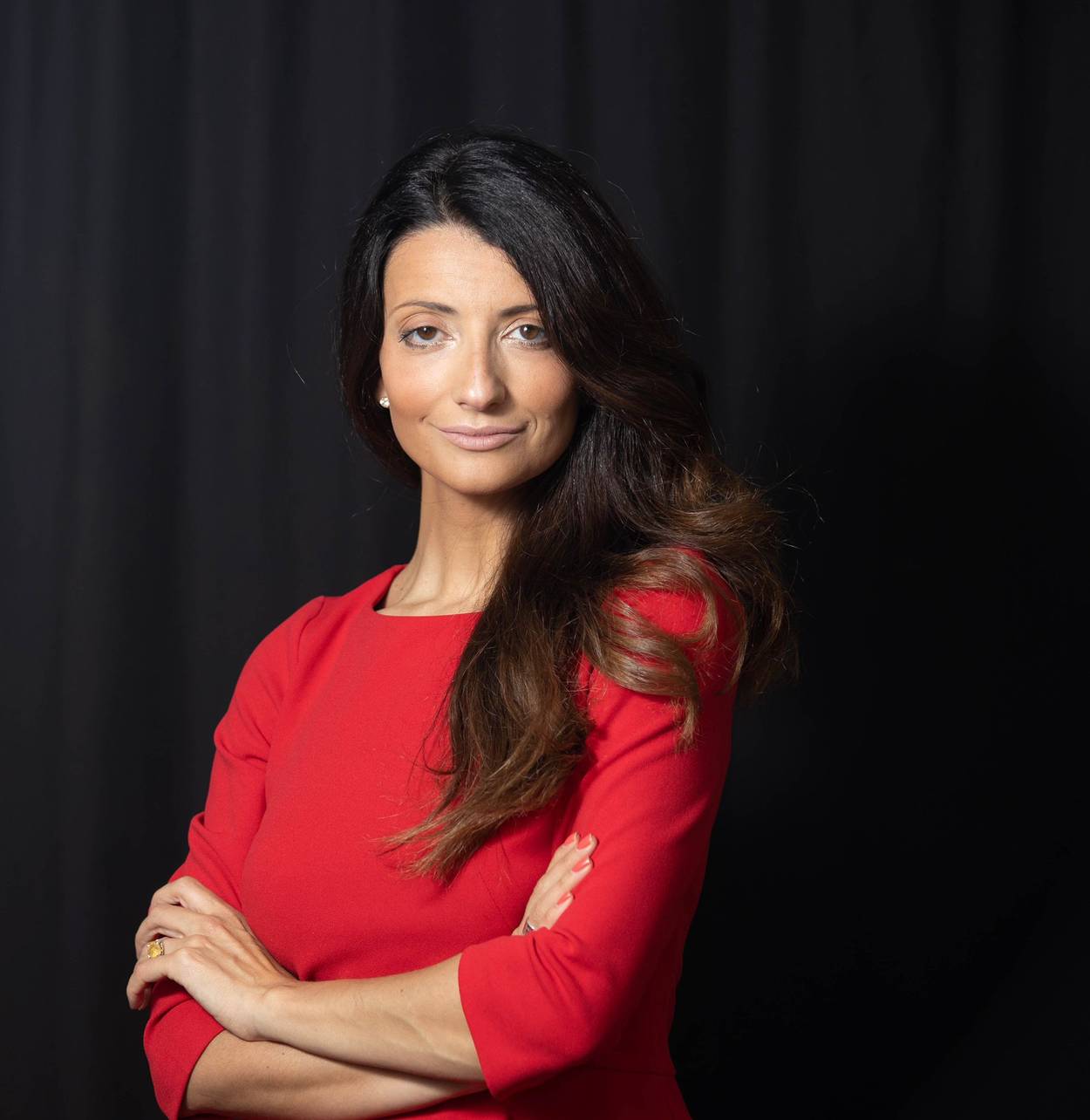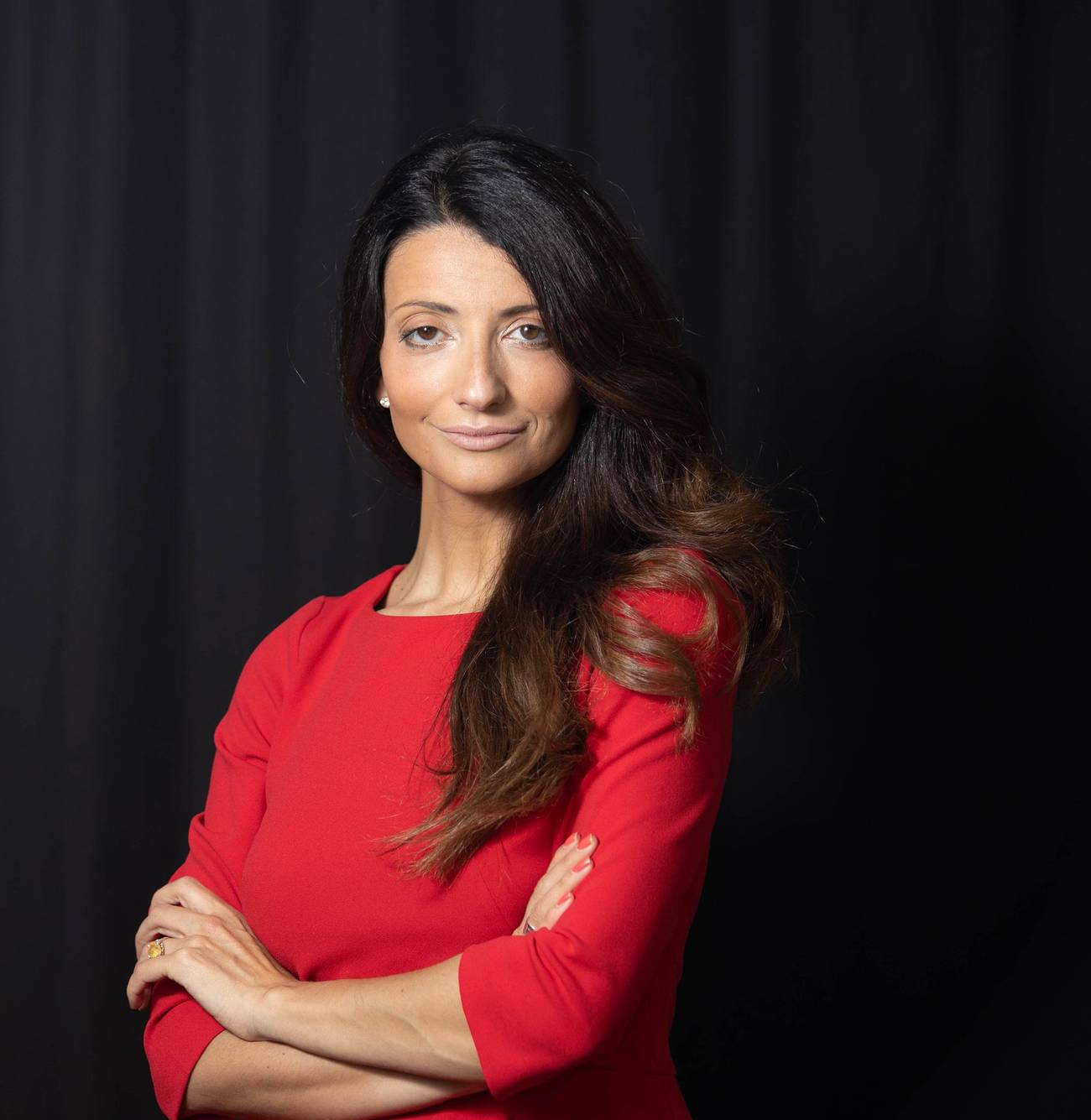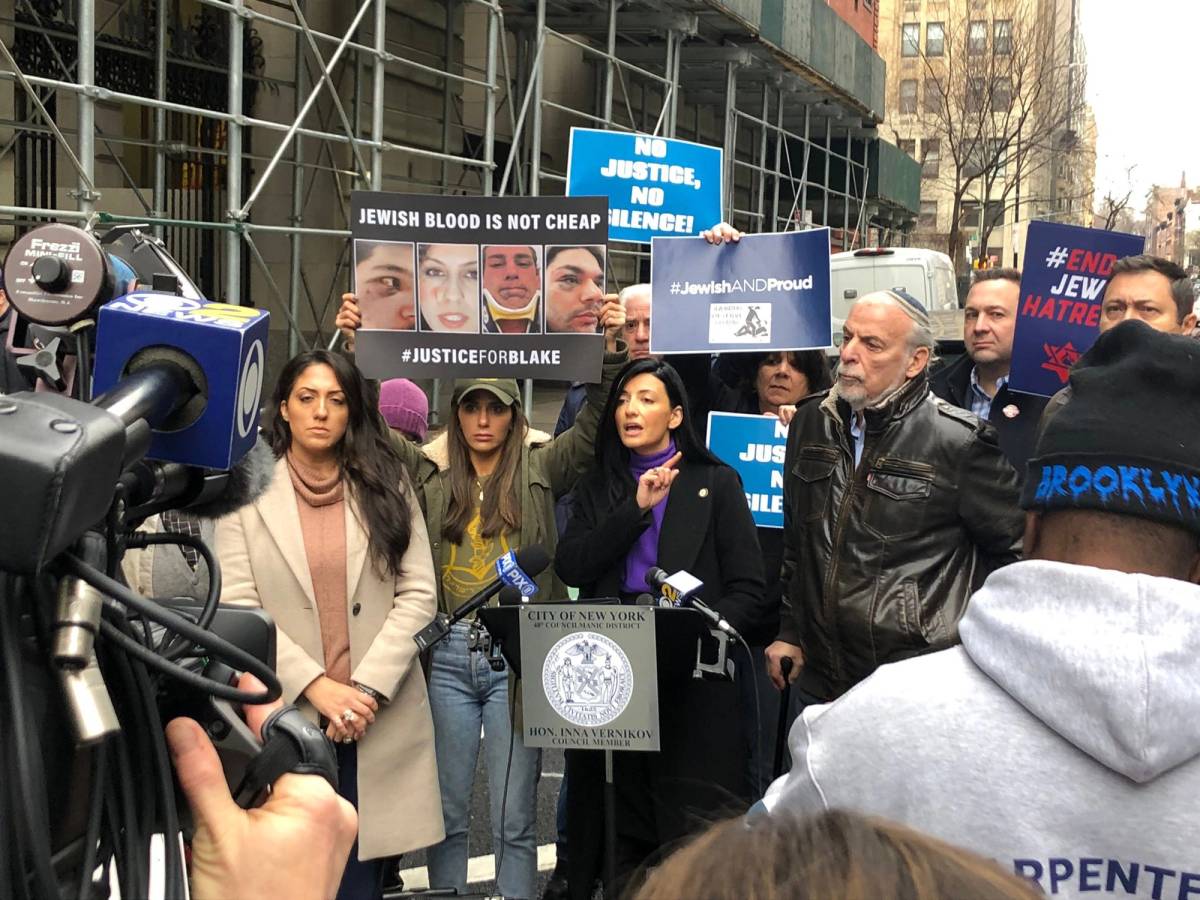Inna Get Your Gun
Brooklyn legislator Inna Vernikov is rising to national prominence by standing up for Israel

Courtesy Inna Vernikov’s office

Courtesy Inna Vernikov’s office

Courtesy Inna Vernikov’s office

Courtesy Inna Vernikov’s office
In August, Inna Vernikov, who represents parts of southern Brooklyn on the New York City Council, was giving a live television interview on Brighton Beach Avenue, the city’s main thoroughfare for immigrants from the former Soviet Union, when a male passerby barged into the frame. He leaned toward Vernikov, who bears a more-than-passing resemblance to Amal Clooney, and kissed her on the cheek, then laughingly went on his way.
Vernikov has long, flowing raven-black hair and high, pronounced cheekbones. But when she speaks, it is in the plain, unvarnished language of Brooklyn’s hinterlands. She responded to the unwanted advance in a tone that was once the hallmark of New Yorkers but which had, of late, become harder to find in the wild: “What the fuck?”
The clip went viral, earning the first-term legislator a share of national attention that has only grown in the ensuing six months. The 39-year-old Vernikov has emerged as a tribune for New Yorkers dismayed by the proliferation of cannabis shops, the unruliness that has become more common in the subway system, the migrant crisis and, most recently, pro-Palestinian protests shutting down streets and bridges.
“I’m very loud,” Vernikov told me unapologetically in her legislative office, which is tucked away on Gravesend Neck Road next to an auto body shop, in a part of Brooklyn where scenesters and hipsters don’t tread. “I’m not afraid to speak up about things that I know other people are afraid to speak up about,” she says.
At a time when some Jews worry about being marked for hate by the mezuzahs on their doorways, Vernikov has embraced the opposite approach. In a recent Fox News interview, she wore a bright blue blazer over a white turtleneck, against which a silver Star of David necklace stood out, catching the studio light. Since Oct. 7, Vernikov’s strong, unapologetic, pro-Israel stance has augmented her popularity with her constituents, while attracting national media attention.
“This is not just about us, this whole war with Hamas,” Vernikov argues. “It’s not just about Jews. They’re against the West.” It is a version of Samuel Huntington’s controversial clash-of-civilizations argument, only the battle lines have been warped by social media and the American academy’s uncontrolled drift into postcolonial incoherence. These days, the would-be revolutionary plastering “decolonize Brooklyn” stickers all over Crown Heights is most likely an Oberlin grad, or an Etsy project manager.
‘Inna’s one person. Why isn’t there a bloc of Jewish elected officials who feel the same way?’
For a generation of Americans primed to see “intersectionality” in every conflict, the Oct. 7 attacks instantaneously fit into a Manichaean view that sees only oppressors and oppressed, colonizer and colonized. The rallies that took place as the kibbutzim of southern Israel were still burning were described as pro-Palestinian, but if the slaughter was the responsibility of Hamas, it stands to reason that there was only Hamas to cheer.
“I was so angry at the protests, specifically that they were taking place like a few days after Oct. 7,” Vernikov says. “It’s like, what are you protesting? While literally blood is still warm, they are yelling ‘intifada.’”
One such protest took place near the campus of Brooklyn College, an area where many religious Jews and Muslims live. It was Oct. 12, five days after the worst attack on Jews since the Shoah. Vernikov showed up with an Israeli flag, which she brandished in front of a barricade holding back the pro-Palestinian crowd.
Vernikov posed for photographs. The soon-to-be-viral images show her in a form-fitting white sweater and tight, bright blue jeans. Tucked against her right hip, and plainly visible in the image, is a handgun. Her subsequent arrest made news, just as had the original provocation. The Brooklyn district attorney dismissed the charges since the gun was apparently neither loaded nor functional. The point had been to send a message, and judging by the outrage of progressives, that message was received.
Several days after the gun arrest, Vernikov met with Ingrid Lewis-Martin, the most powerful adviser to Mayor Eric Adams. Himself a forthright supporter of Israel, Adams appeared to endorse her message to the pro-Palestinian protestors. HellGate, a news site that covers city politics from a progressive perspective, wondered with unalloyed scorn why a top City Hall staffer would sit down for tea with a “reactionary” like Vernikov. Probably because Adams understands the city more or less like Vernikov does, as much more moderate than progressives want to believe. “Most of her district sees her as a hero now with the war going on in Israel. Many are conservative and have no problem with gun ownership,” political consultant Hank Sheinkopf told the New York Post.
“She’s a tough young lady,” says Dov Hikind, a former state legislator from Brooklyn in whose office she previously worked. “She’s a real fighter,” he added, before wondering why she often appears to be standing alone. “Inna’s one person. Why isn’t there a bloc of Jewish elected officials who feel the same way?”
Vernikov was born in Chernivtsi, a Ukrainian city close to the Romanian border. The Nazi killing squads of Einsatzgruppe D, led by the dreaded butcher-sophisticate Otto Ohlendorf, swept through the region in 1941; Vernikov believes she lost more than half a dozen family members to the Holocaust. Her family came to the United States in the mid-1990s, settling among Brooklyn’s large community of Russian Jews.
The Jews of Sheepshead Bay and the Jews of the Upper West Side may come from the same shtetls, but the many decades between their respective arrivals in the United States have created two divergent cultures. The newer Jews are tougher, less enthralled by Annie Hall than by Fauda, more open about their bond with Israel, even if they have never been there. These were the Jews I knew growing up, Jews to whom Inna Vernikov makes perfect sense. “I don’t think we should ever call ourselves victims,” Vernikov said. But, she added, Jewish suffering should not go unacknowledged.

Courtesy Inna Vernikov’s office
Vernikov went to law school in Florida, then returned to New York to work for Hikind and, later, as a small-time immigration lawyer. She first ran for office in 2021. Like many Russian Jews, she was a Democrat who became a Trump supporter. “I can’t support the Democratic Party, which is no longer the party of John F. Kennedy or Bill Clinton,” she told one news outlet in 2021. As an attractive young woman running as a Republican in an overwhelmingly Democratic city, she was a political curiosity—and savvy enough to earn the endorsement of Donald Trump Jr., whose grandfather built Trump Village in what decades later would be Vernikov’s district. She beat her Democratic competitor, Steven Sapperstein, with ease, assuming office in early 2022.
Vernikov first made news by opposing vaccine mandates, which many Orthodox Jews were also against; Russian Jews are pro-science, broadly speaking, but tend to bristle at mandates of any kind. “I’m not afraid to speak up about things that I know other people are afraid to speak up about. And that’s why it gets a lot of attention from the media.” Shortly after assuming office, she pulled funding earmarked to the City University of New York Law School, after its faculty council endorsed a resolution supporting the boycott, divestment, and sanctions movement against Israel.
A few years ago, supporting Israel in New York City would have been an uncontroversial position for all but the most remote reaches of the left. Today, even Jewish city leaders have been cowed into submission. The city comptroller, Brad Lander, is Jewish but he supports a cease-fire, likely in an effort to court progressives ahead of a mayoral run that seems unlikely to go anywhere. Lincoln Restler, a progressive City Council member from brownstone Brooklyn, has been much harder to pin down. He surely has opinions but is plainly hoping no one asks what they are. (For the record, I asked him; Restler directed me to his communications director, who did not respond.)
Jews remain influential in New York politics—Eric Adams has the Haredi bloc to thank for his victory in the Democratic mayoral primary in 2021—but not nearly as influential as only a decade or two ago. There now remains a single Jewish congressman in a city that once sent a veritable minyan to Washington. “What you have is a lack of identity of Jews as Jews,” Sheinkopf, the Democratic insider, told The Washington Post in 2022, a development he found “astounding.”
Toward the end of October, several Jewish students at the Cooper Union in Greenwich Village were locked in the library—for their own safety, they were told—as pro-Palestinian students marched through the university’s halls, banging on the door and windows of the library. In a strange disconnect, national social media seemed more perturbed by the incident than did New Yorkers themselves, having apparently become accustomed to anti-Jewish hatred by years of slurs and physical attacks.
That evening, Vernikov phoned the Jewish students, then used a long X thread that read like a legal brief to describe how the school failed the students and lied to the rest of the city. The press conference she held with the students and their attorneys the following day was covered by national outlets like Politico and Newsmax.
“Some people say that I am a camera chaser,” Vernikov told me. She argues that she is giving voice to a silent majority that, even before Oct. 7, often wondered why its representatives in City Hall were busy legislating against weight discrimination instead of making the city itself safer and more affordable for working New Yorkers. Since the terror attack, Vernikov has regularly called out pro-Palestinian supporters who have blocked tunnels and bridges, infuriating ordinary New Yorkers who are trying to pick up their kids from school or make it home for dinner.
Tonight, on the third night of Chanuka, I am at the @NYYRC Gala proudly wearing a dress emblazoned in the flag of Israel 🇮🇱. So many Jewish New Yorkers & Jewish college students all over our country are afraid to display their Jewish identity, wear a Kipa, a Star of David, or… pic.twitter.com/F45usKmvhs
— Councilwoman Inna Vernikov (@InnaVernikov) December 10, 2023
“People are sick and tired of the chaos and anarchy,” she wrote on X after a furious driver shoved pro-Palestinian protesters out of his way. “@NYCMayor please take control of your city!”
On Dec. 10, Vernikov showed up at a Republican gala in Manhattan in a flowing and resplendent blue-and-white dress adorned with the Israeli flag, and posted the image to her X account. “We cannot be afraid! We cannot remain silent! Be Jewish, Be Loud, Be Proud!,” she wrote in an accompanying post. “This is where we live and we will not be intimidated!” The post has 17 million views.
Vernikov’s critics say she is engaged in the same performative politics as her lefty colleagues. “It’s pretty clear she’s interested in higher office,” one local advocate who works with the City Council told me, charging that Vernikov is trying to raise her national profile ahead of a congressional run. “She’s not paying a lot of attention to issues in her district.” Vernikov counters by pointing to her work on housing and policing. She is currently working with other legislators to combat food stamp fraud, a cause unlikely to earn her a prime-time spot on Fox News. Last week, she testified in Congress on the impact on New York City of the Biden administration’s border policy.
Although Vernikov is clearly ambitious, and Adams is possibly facing federal corruption charges, I was left with the distinct impression that Vernikov is more interested in heading down to Washington than running for citywide office. Her most likely means of getting there would be to challenge Rep. Yvette Clarke, a seasoned political operator who has resisted progressive constituents’ calls to publicly support a cease-fire in Gaza.
But that congressional district is significantly more liberal than the City Council one Vernikov represents today. If Vernikov runs against Clarke and wins, it could be a sign that Oct. 7 was a watershed moment in American politics. “I think after Oct. 7, the world really changed,” Vernikov told me. “And I think that if there is an opportunity for me to be a voice on a broader scale, I don’t think I would decline. You know what I mean?”
Alexander Nazaryan writes about culture and politics. Find him on X: @alexnazaryan